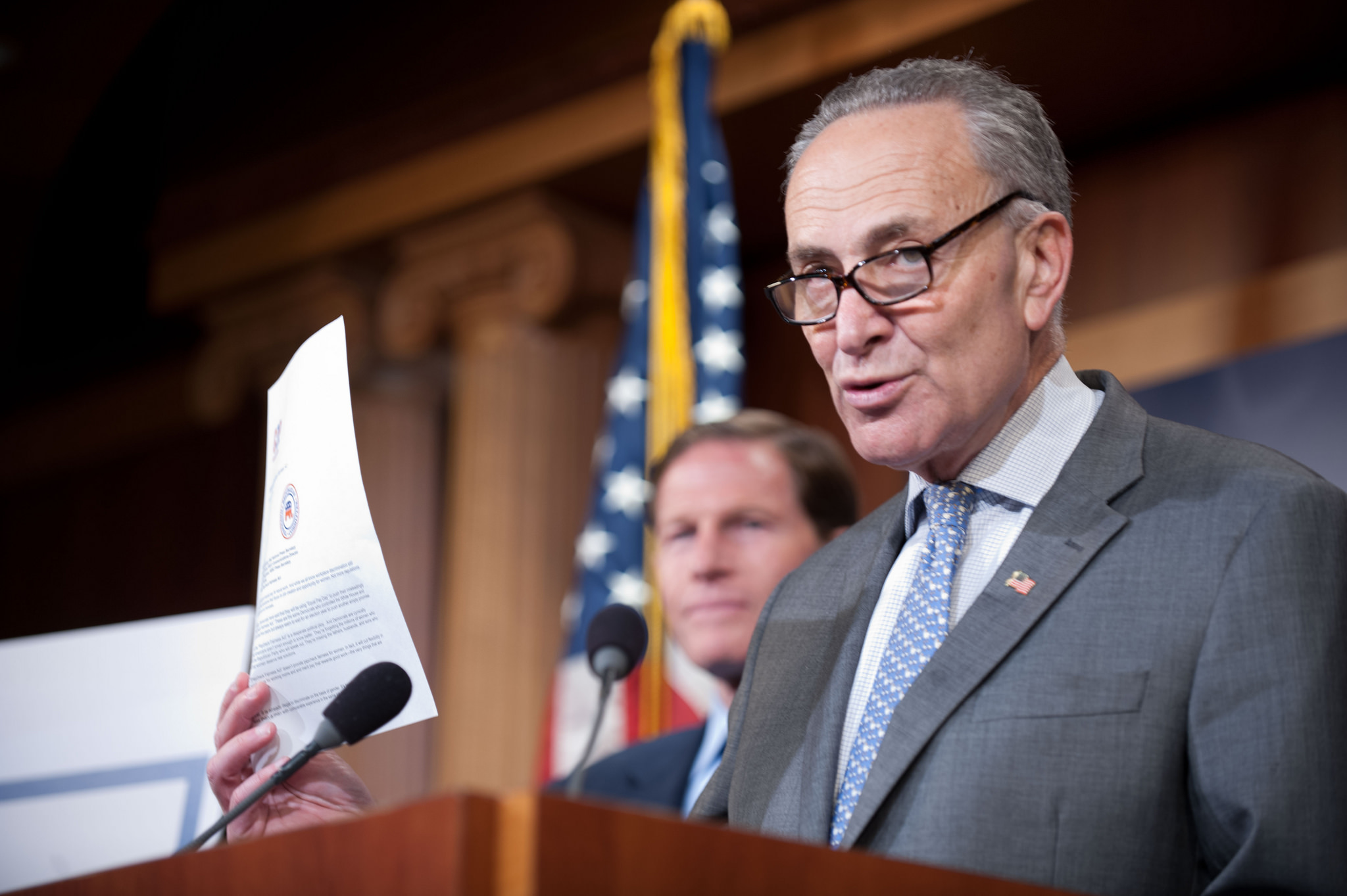Politics
Schumer Blames GOP For Marijuana Banking Failure, But Says He’ll ‘Go Back At It Next Year’

Senate Majority Leader Chuck Schumer (D-NY) says that two top Republican senators re ultimately to blame for keeping marijuana banking out of a large-scale spending package that was released on Tuesday—but he pledged to “go back at it next year.”
At a Democratic Senate leadership briefing on Tuesday, the majority leader was pressed on the exclusion of the Secure and Fair Enforcement (SAFE) Banking Act from omnibus appropriations legislation, which supporters had hoped would be used as the vehicle for the reform during the lame duck session.
Schumer placed the blame at the feet of Senate Minority Leader Mitch McConnell (R-KY) and Senate Banking Committee Ranking Member Pat Toomey (R-PA), who he says objected to including the reform in the spending bill.
A Senate source had said last week that the majority leader was “making a last ditch effort” to attach the cannabis banking language to the spending bill—but the majority leader wasn’t able to get the deal done. He said the issue would need to wait until the next Congress, which will see Republicans in control of the House.
“We had very good bipartisan support. We had hoped to get it done,” Schumer said. “I worked for months with different Republicans, led by [Sen. Steve Daines (R-MT)]—but at the last minute, both senators Toomey and McConnell opposed it.”
“It is bipartisan. It has the support of many different groups. We’re going to go back at it next year,” the majority leader said.
McConnell had applauded the exclusion of SAFE Banking from the National Defense Authorization Act (NDAA) bill earlier this month, and he made clear that he was going to fight against attempts to advance it through appropriations as well.
Toomey, meanwhile, was among a small group of senators who met with the Justice Department this month to seek assurances that issues it raised over SAFE Banking in an earlier memo had been effectively resolved. Evidently, the senator was left unsatisfied and worked to keep the reform out of the appropriations package.
It’s clear that negotiations were sensitive around adding anything new to the spending bill, and drug policy reform suffered as a final deal was forged. In addition to the lack of SAFE Banking language, the legislation also omitted several other reform proposals that were attached to spending measures approved in the House and Senate earlier this year. The final bill also maintains a rider that blocks Washington, D.C. from implementing a system of regulated cannabis commerce—another major setback for advocates.
The lack of SAFE Banking language leaves supporters with few legislative options—and very little time—to advance the reform during the final weeks of the lame duck. And advocates are still left waiting to see the final product of negotiations that Schumer is spearheading to create a package of incremental marijuana policy changes known as SAFE Plus that’s expected to include banking and expungements provisions.
Daines, the lead GOP sponsor of the SAFE Banking Act, decried its being left out of the appropriations measure.
“The failure to pass my bipartisan ‘SAFE Banking Act’ means communities in Montana and across our country will remain vulnerable to crime where legal businesses are forced to operate in all-cash,” he said in a press release. “This bill to promote public safety would have been well positioned to pass had it gone through the regular committee process—as I called for more than a year ago. Our small businesses, law enforcement and communities deserve better.”
Like Schumer, most advocates will now look ahead to 2023 and the possibility of advancing the reform in a divided Congress.
Senate Banking Committee Chairman Sherrod Brown (D-OH) had signaled that he viewed cannabis banking as a likely 2023 issue, though a staffer said last week that he was still be open to passing it through the spending package if it contained broader provisions.
Rep. Patrick McHenry (R-NC), who will serve as chairman of the House Financial Services Committee in the next Congress, recently indicated that he similarly feels the issue will need to be decided after the lame duck. The congressman said that he remains opposed to SAFE Banking, but he left the door open to advancing it if that’s the will of his Republican colleagues.
“What I’ve pledged is having an open process. I told my members my view of it,” he said. “Members are able to come to their own conclusion about the bill. It’s so variable state by state.”
For his part, Sen. Cory Booker (D-NJ) has also pinned blame on McConnell, saying that his vocal opposition to cannabis reform has had a chilling effect of GOP members who might otherwise be amenable to passing legislation that contains SAFE Banking language.
“They’re dead set on anything in marijuana,” he said, referring to Republican leadership. “That to me is the obstacle.”
“The caucus is clearly divided but the people in power in their caucus are clearly against doing anything on marijuana,” he added.
Earlier this month, SAFE Banking sponsor Sen. Jeff Merkley (D-OR) said that he would “keep fighting” to get the reform “passed this year,” adding that “this is not the end of the road.”
“We need to make sure that legal cannabis businesses have access to the financial services they need—operating in cash is an open door to robbery and money laundering,” he said. That’s also a point highlighted in a recent analysis that looked at the trends and motivations for crimes targeting cannabis businesses in Washington State.
Photo courtesy of Senate Democrats.














